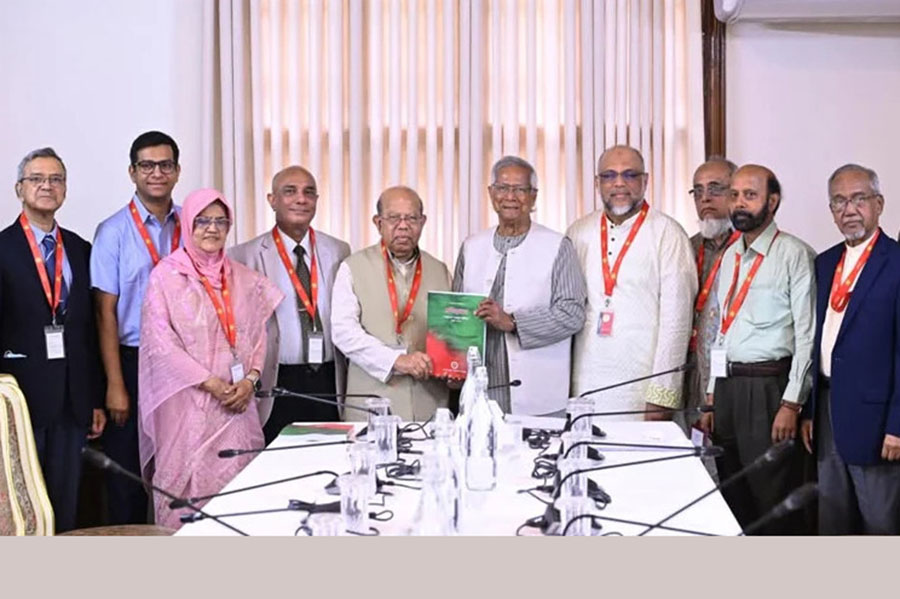
Published :
Updated :

The Health Sector Reform Commission has proposed to enact seven new acts for transforming the health services to be pro-people, recommending the formation of an independent commission to oversee the sector’s activities.
The Bangladesh Health Commission, which can be formed through an ordinance by the interim government, will work to implement health in all policies (HiAP) and ensure transparent, accountable, and effective health services through its 17 divisions.
It will be accountable to the government and submit an annual report to the parliament.
These were disclosed during a press conference by the commission team members at the Foreign Service Training Academy on Monday after submitting the Health Sector Report to Chief Advisor Professor Mohammad Yunus.
Commission team leader National Professor AK Azad Khan briefed the journalists along with his team members. Dr Abu Mohammad Zakir Hossain presented key features of the reports.
The team leader said the report was prepared after consultation with different stakeholders and discussion with experts and professionals, and recommendations came based on the consensus and study findings to assess the needs of the mass people.
“Though health is said to be a right, the legal side is absent in the present situation,” he said, adding that the commission has given the highest priority to primary health care, health education, research, institutional reform, pay scales, etc., to ensure people’s rights to good health.
Other proposed new acts are the Bangladesh Health Service Act, Primary Health Service Act, Health Protection Act, Medicine Price Fixing and Entry Act, Allied Health Service Act, Professional Council Act, and Bangladesh Medical Research Council Act.
The members disclosed that all these acts will be formulated by evaluating existing acts for making those timely.
Member Dr Abu Mohammad Zakir Hossain while presenting the key points of the reports, said unification of different health service agencies, decentralisation of health services, reformation in the referral system, clinical and medical college standandisation, budget allocation to the sector, raw materials for pharmaceutical sectors, digital platforms for complaint lodging, and women's and children's health services have been identified to work for reform.
He said the report also tried to address the loss of the country’s foreign currency of US $4 billion to $5 billion for treatment abroad and avail the reputed Bangladeshi expatriate physicians for improving the health service.
The interim government formed that Health Sector Reform Commission on November 18, 2024 with Prof AK Azad Khan (chief), president of Diabetic Association of Bangladesh; Prof Md Muhammad Zakir Hossain of Public Health and Health Informatics Department at BSMMU; Prof Dr Liaquat Ali, chairman of Pothikrit Foundation; Prof Dr Sayera Akther, a gynecologist; Prof Dr Naila Zaman Khan, a neurologist, the Department of Pediatric Neuroscience; MM Reza, former secretary; Prof Dr Muzaherul Huq, former regional adviser (South-East Asia Region) at the WHO; Dr Azharul Islam, ICDDR,B; Prof Dr Syed Md Akram Hossain, Square Cancer Centre, Square Hospital; Prof Dr Syed Atiqul Haque, chief consultant of Green Life Centre for Rheumatic Care and Research; Dr Ahmed Ahsanur Rahman, scientist at ICDDR,B; and Omair Afif, a student of Dhaka Medical College as members.
The team started working on December 3, 2024, and worked for five months to prepare the report.
smunima@yahoo.com


 For all latest news, follow The Financial Express Google News channel.
For all latest news, follow The Financial Express Google News channel.